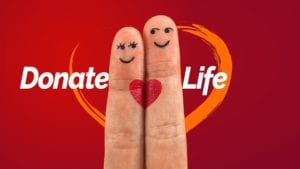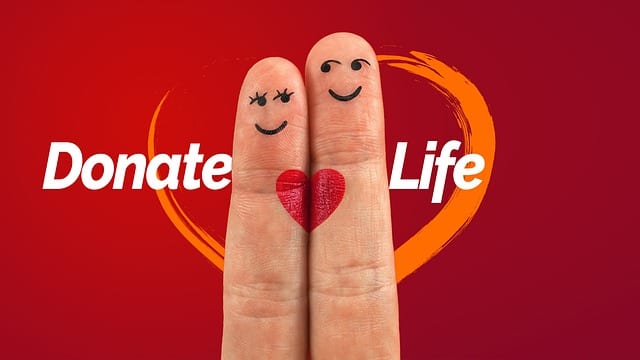By Ivey D.
Do you know someone who has had an organ transplant? If not, have you ever thought about it? I didn’t. I checked off organ donor on my license and went on with my life. Then, I found out I needed an organ transplant; suddenly that checkmark meant a lot more to me.
People need organ transplants for many reasons – birth or genetic defects, or disease. I needed one because I was a Type 1 diabetic; one of the long-term effects of that disease is kidney failure. Currently kidney disease is the 9th leading cause of death in the US.
Over 100,000 people are on an organ transplant waitlist
Did you know that kidneys are also the most needed organ for transplant? The organ transplant waitlist has 114,000 people on it, with over 94,000 of them for a kidney.
I found out that kidneys are one of the organs keeping us alive by filtering our blood, controlling blood pressure, making red blood cells, keeping bones healthy, and controlling our pH level. When my kidneys stopped working correctly, felt miserable; I was nauseous, itchy, cold, and couldn’t concentrate or think. I was tired all the time because I wasn’t making new red blood cells. I was swollen like a beach ball because I couldn’t get rid of the extra fluid in my body.
My doctor mentioned transplant but that scared me so I didn’t even think about it until years later. Eventually my kidneys failed enough to require dialysis, which is a whole other beast.
 Dialysis is not a lifesaver; it is a life-sustainer. There was the surgery to receive a port for the dialysis, training (which took days), and home inspection to make sure it was sterile enough for home treatment. After all that came the diet education because kidney failure requires you to keep a strict diet. You can only drink a max of 32 oz a day. You must limit salt, tomatoes, potatoes, dairy, deli meats, dark soda…the list goes on and on and on. This means no pizza, French fries, hummus, nachos, guacamole, hero sandwiches, cheese, milkshakes, frozen yogurt, Coke/Pepsi/Dr. Pepper and more.”
Dialysis is not a lifesaver; it is a life-sustainer. There was the surgery to receive a port for the dialysis, training (which took days), and home inspection to make sure it was sterile enough for home treatment. After all that came the diet education because kidney failure requires you to keep a strict diet. You can only drink a max of 32 oz a day. You must limit salt, tomatoes, potatoes, dairy, deli meats, dark soda…the list goes on and on and on. This means no pizza, French fries, hummus, nachos, guacamole, hero sandwiches, cheese, milkshakes, frozen yogurt, Coke/Pepsi/Dr. Pepper and more.”
I had to connect to a machine nightly for at least 10 hours. In order to get to work at Fresh Green Light, I started my treatment process by 9:15 pm. Dialysis meant weekly doctor appointments, blood draws and urine tests. Between being exhausted and needing to be home to start treatment, there was no time or energy for a social life.
I was on the organ transplant waitlist for at least 7 years, 3 of those in dialysis treatment. Remember, kidneys are the most needed organ thus their waitlist is the longest. During that time, I met someone who was also diabetic and had had a kidney and pancreas transplant. She received her call 5 days after being approved for the double transplant. Like me, she waited 7 years. I followed her lead and changed my waitlist enrollment to a double-organ, kidney, and pancreas. I could list for two organs because I was a T1 diabetic for over 20 years and had complications.
 Being listed as a double-organ transplant recipient sped up my wait time on the list. After being approved, I waited another 5 months before a match was found. I got the call on Friday February 3rd at 4 pm. By Saturday I was recovering from a kidney/pancreas transplant. My third birthday just passed and Fresh Green Light celebrates with me every year!
Being listed as a double-organ transplant recipient sped up my wait time on the list. After being approved, I waited another 5 months before a match was found. I got the call on Friday February 3rd at 4 pm. By Saturday I was recovering from a kidney/pancreas transplant. My third birthday just passed and Fresh Green Light celebrates with me every year!
There are two types of donors
There are 2 ways to receive a kidney donation – from a living donor or a deceased donor but most are from deceased donors. To receive a transplant, patients rely on a lengthy algorithmic matching system that takes into account multiple health qualifications of both the donor and recipient. It is up to the kidney patient to find a living donor or be lucky enough to get a call about a non-directed organ donation.
Choosing to be an organ donor can help save the lives of potentially hundreds of people. Not only can a deceased donor donate a kidney and pancreas but they can also donate: livers, lungs, hearts, intestines, corneas, tissue, skin, bone marrow, heart valves, faces, hands, tendons, blood, and platelets.
But many people are scared to do it or don’t think they can be a donor. With National Donor Day on February 14th, let’s debunk the myths about organ donation.
MYTH: If you are in an accident, doctors won’t give you the best care if you are an organ donor.
TRUTH: Doctors will do EVERYTHING in their power to save you! Regardless of what your license indicates, doctors and hospitals are there to SAVE YOU.
MYTH: I’m not old enough to be an organ donor.
TRUTH: Many states allow organ donation starting at age 16. Connecticut, New York and Illinois allow teens 16 and over to register as an organ donor. If this is your decision, be sure to let your family know. For teens under 18 years old, the final donation decision is the responsibility of their parents or legal guardian. If they do not know that you want to donate, it may not happen.
MYTH: I have a condition and don’t think I can be an organ donor.
TRUTH: Don’t rule yourself out for donation. Neither age or medical condition will prevent possible donation. Doctors will make an assessment at the time of death of the viability of organs. Even if one organ cannot be donation, that doesn’t mean something else can’t be used.
MYTH: My religion won’t allow me to be an organ donor.
Most major religions not only support organ donation as an individual right but encourage it as an act of generosity and compassion. This includes most branches of Judaism, Buddhism, Islam, Christianity and more.
Now that you have some of the basic facts, why should you consider donation?
Out of 50 states, Connecticut ranks 9th to last and New York ranks second to last for registered organ donors. However, Illinois has one of the most successful state registries in the country with more than 6 million participants. We can do better in Connecticut and New York! Let’s register to be organ donors!
 https://www.donatelife.net/register/
https://www.donatelife.net/register/
If my donor had not communicated with their family about their wishes or checked the box to become an organ donor on their license, I might not be here to tell my story and educate the public. I have lived these past 3 years due to the generosity and selflessness of one New Yorker!
Being an organ donor can make a big difference and not just for one person, but for many people and their families. Families of organ donors say that knowing their loved one helped save or improve other peoples’ lives helped them cope with their loss. My donor family felt this way.
I am Ivey, a double-organ transplant recipient and I work at Fresh Green Light Driving School.

